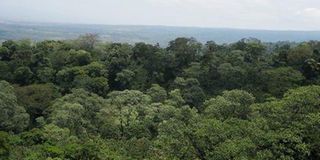Deforestation alarming, say experts

Although a sizeable part of the country is covered by forests, 43 per cent of which is set aside for conservation purposes the increasing demand for timber makes forests vulnerable to tree felling.PHOTO|FILE
What you need to know:
- With illegal logging and charcoal making increasing by the day, the negative impacts of the malpractices also keep becoming vivid. Despite the fact that there are people who make their livelihoods from forest products, charcoal makers pose the biggest threat to forests.
Dar es Salaam. While Tanzania and other nations continue to fight deforestation and environmental degradation, ever-increasing electricity prices will hamper such efforts, analysts say.
With illegal logging and charcoal making increasing by the day, the negative impacts of the malpractices also keep becoming vivid. Despite the fact that there are people who make their livelihoods from forest products, charcoal makers pose the biggest threat to forests.
Moreover, illegal tree felling results in revenue loss.
It also harms conservation efforts and fuels corruption.
Although a sizeable part of the country is covered by forests, 43 per cent of which is set aside for conservation purposes the increasing demand for timber makes forests vulnerable to tree felling.
Conservationists say the rate of forest degradation is alarming.
Deforestation rates are estimated at between 100,000 and 420,000 hectares a year.
The response by the government to tame the scourge has seen a number of programmes drawn up. Moreover, non-governmental organisations have joined hands to fight deforestation.
Local communities have also been involved in the process. The community-based forest management has succeeded in most parts but more efforts are needed.
Mama Misitu, a campaign aiming at improving the governance of Tanzania’s forest resources and reducing illegal forest harvesting, has been carried out in different fora. The plan is to reach more people through television.
Mama Misitu Campaign ambassador Asha Mwilu, who also features in TV ads, said: “We, charcoal users, are among the driving forces for forest depletion…we need to start looking for alternative sources of energy to save our forests.”
She said alternative energy sources were needed instead of charcoal in urban areas such as Dar es Salaam.
TV ads are just one element of a large package of communication materials that are used to educate the public on forest governance,” said Mama Misitu communications officer Sophia Masuka.
With the Bank of Tanzania reporting a staggering loss of about Sh6.8 billion in forest revenue annually from royalties and harvesting licences, the country will continue to lose big amounts of money unless interventions are made.
A recent report by TRAFFIC shows that illegal timber trade is highly detrimental to Tanzania’s forestry due to losses in taxes, royalties and fees normally attached to the legal harvesting of forest products.
“Often, harvesting permit holders ignore their allowed quota of timber and cut down more trees than allowed,” said Cassian Sanga, from the Tanzania Natural Resource Fund.
Mama Misitu Campaign manager Gwamaka Mwakanjala said communities stand to lose greatly if they continue harvesting forest products unsustainably.
“This campaign tells us that, the likely impact of sustainable harvesting such as clearing of forests for farming, unplanned fires in forests, illegal harvesting of forest products for charcoal making and trading, will threaten the future of our resources,” Mr Mwakanjala said.




